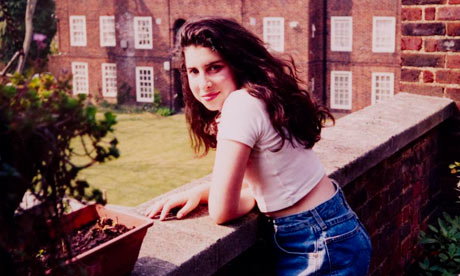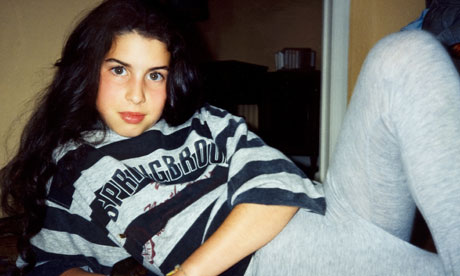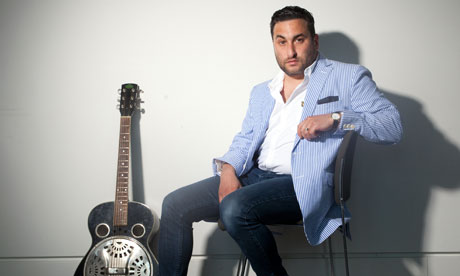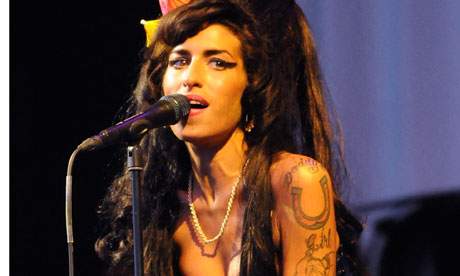
'She was annoying, frustrating, a pain. But she was also incredibly generous, very caring': Amy Winehouse as a teenager outside her grandmother's flat. Photograph: Winehouse Foundation
A few months ago, almost two years after his sister Amy's death at the age of 27, Alex Winehouse was sorting through her possessions and came across a child-size navy blue jumper. The jumper turned out to be part of Amy's old school uniform from Osidge Primary School in Southgate, north London that, unbeknown to her family, she had stowed away carefully for years.
"I couldn't believe she had that," Alex says now, sitting in a sun-streamed room, one leg resting across the other and leaning back in his chair. This is his first ever full-length interview, given to mark the opening of a major new exhibition at the Jewish Museum entitled Amy Winehouse: a Family Portrait. The school jumper, Alex says, is his favourite exhibit.
"I think it shows that it doesn't matter what happens in life, how famous you become, regardless of who you are, you're always from somewhere," he explains. "No matter what you do, you can't forget that because it makes you who you are. And she never forgot. It was very reassuring to see that for me."
There is a photograph of the two Winehouse siblings from that time. It shows Alex, the elder by four years, with a protective arm around his little sister's shoulders. Amy, not yet 10, has her chin cocked towards the camera, displaying even then a defiant kind of confidence.
To the outside world, the name Amy Winehouse went on to become synonymous with both talent and tragedy. She lived her life out in the full glare of the public spotlight and then she died in July 2011 after an alcohol binge, three years shy of her 30th birthday. She was renowned for her husky contralto vocals and her ability to fuse the classic melodies of soul, jazz and R&B, making them relevant to a modern audience. In her short career, she won many awards, including a Brit, three Novellos and six Grammys. Her second album, Back to Black, is currently the UK's best-selling album of the 21st century.

In style terms, too, Winehouse redefined what we came to expect of a pop star. Instead of being primped and packaged as a teen-market popstrel, she had a towering beehive, heavy eyeliner and a fondness for leopard-print and tattoos. Karl Lagerfeld claimed her as his new muse in 2007 and sent beehived models down the Chanel catwalk; French Voguededicated a whole fashion story to her look and hundreds of girls bought a version of her style on the high street.
But there was, of course, a darker side to Amy Winehouse: a trail of disturbing media stories and paparazzo images tracked her painful disintegration. Photos appeared of her on London streets, tear-stained and with bleeding feet, or with badly bruised legs. The lattice of scars on her arms from a period of self-harm and cutting in her teens were often visible. Her drink and drug abuse was well-documented. In 2008, a tabloid newspaper published a video that appeared to show her smoking crack cocaine. Over the years, she was in and out of rehab.
For much of HER LIFE, it seemed as if we knew everything about her. But the exhibition will reveal a different, more intimate side. And for Alex Winehouse, she will always just be his little sister, which is why that school jumper meant so much to him. It was a reminder of what she had been, before the madness spiralled out of control, before the world claimed her as a celebrity and her addictions destroyed her.
"Do you have a sister?" he asks me when I wonder what Amy was like. I nod. "Then you'll know. She was annoying, frustrating, a pain in the bum. But she was also incredibly generous, very caring. She'd do anything for anyone, she really would. She was loyal – as a sister, daughter and friend. She was probably the most loyal friend to people I've ever known." Later, he adds: "She was a really good person. And horrible in other respects."
The exhibition will include several of her personal effects and items of clothing and will also trace the Winehouse ancestry back generations to those who emigrated to London from Russia and Poland in the late 19th century.
The aim, says Alex, is to portray his sister "as a normal person and us as a normal family" and to show how Amy was influenced by an ingrained Jewish identity. Their parents, Mitch and Janis, who divorced when Alex was 13 and Amy was nine, brought them up with an appreciation of the faith's rituals and rites of passage. As adults, neither of the siblings was particularly religious, but they felt culturally Jewish – Amy was famously meant to have cooked chicken soup for her bodyguards.
"She made it once for me," says Alex, screwing up his face in distaste. "It was awful."

Is there a part of him that sees the exhibition as a means of reclaiming the sister he knew, rather than the pop star fame created?
"I don't think you can," Alex says after a moment's thought. "I don't think that's possible. I'm not really fussed about how she's perceived because I know the truth… That's more important than what people think."
Alex Winehouse has never before spoken publicly in depth about his sister. At the height of her fame and throughout the shambolic latter years of her life, he stayed under the radar. He says he wanted to be a refuge for her from the strangeness of her celebrity – he describes visiting Amy occasionally at her Camden flat and seeing banks of photographers camped outside.
"She was pretty much shut in the house and couldn't go anywhere," he remembers. "I'd go home, back to normality. She didn't have that. The interest that they had in her was absolutely insane. She didn't want it but her every moment was covered in the press."
Part of him, too, feels that his recollections of Amy are "no one's business, because there's a lot of dramas associated with her and that still goes on. If I'm going to speak, it's because I – or we, the foundation – are doing something really, really cool. I'm not going to talk for the sake of talking."
The Amy Winehouse Foundation, set up by her family in the wake of her death, works to prevent the effects of drug and alcohol misuse on young people. A schools programme launched in March by the foundation has already made substantial donations to various charities. Alex, who gave up his job as an online music journalist to work full-time for the foundation with his father, a former black-cab driver, says the experience has brought the family closer together. In the aftermath of Amy's death, Alex explains, "Dad had two choices – he could either let it destroy him, or use Amy's memory to invigorate himself to do something good."
But after so many years not talking, there is a part of Alex that finds it difficult to change the habit. He chooses his words carefully and seems determined not to show too much emotion. He prefers humour to introspection. When he talks about going to hospital when Amy was born in 1983 and being given his baby sister to hold, he says: "She smelled and I didn't like it. She stank. It was that milky, newborn smell and I just thought, 'I don't like the smell, I don't like you. Why are you in my house?'"
He laughs. Did it get better after that?
"Eventually," he says drily. "Took a while though."

There is a sense that he doesn't want to come across as overly sentimental or – worse – risk cheapening his own, private memories by giving them up for public consumption.
And yet Alex is also extremely honest. When I ask if he ever listens to her music, now he shakes his head and admits, a touch shamefacedly, that her songs were "not really my taste… I'm more of a rocker than she was." And when I touch on the notion that, however much he loved her, it must have been extremely difficult at times being her brother and seeing her so hell-bent on self-destruction, he doesn't flinch.
"Of course. Dad says it all the time: there's only so much you can do. You can be there on the phone, you can go and see them and things, but ultimately, it's your own responsibility and if the person has no interest in getting better, then there really isn't much you can do. You've got to live your own life as well or it will destroy you as much as the other person."
Alex has had time to reflect on what triggered Amy's spiral into drink and drugs, but hasn't come to any clear conclusion other than "we took different paths". He describes himself as "a worrier" and "an anxious child". By contrast, "Amy wasn't like that. She had no limits."
Many of her problems predated her sudden rise to fame. She developed bulimia in her late teens and the eating disorder dogged her for the rest of her life. Alex remembers her at the age of 17 hanging out with a group of girls who "were all doing it. They'd put loads of rich sauces on their food, scarf it down and throw it up. They stopped doing it, but Amy never really did… We all knew she was doing it, but it's almost impossible [to tackle] especially if you're not talking about it. It's a real dark, dark issue.
"She suffered from bulimia very badly. That's not, like, a revelation – you knew just by looking at her… She would have died eventually, the way she was going, but what really killed her was the bulimia… Absolutely terrible."
What does he mean by that? "I think that it left her weaker and more susceptible. Had she not had an eating disorder, she would have been physically stronger."
Emotionally fragile as she was, Alex says his sister never consciously courted media attention. "All she wanted to be was a singer and have a good career and that was it really. It [the attention] was slightly out of whack with what she was. She won the Brit in 2007 and no one knew who she was before that. I remember bumping into her on the tube once and she was on her own. Then, all of a sudden, that was it. In the space of one evening she'd gone from being able to do whatever she wanted to not being able to do that ever again."
The drugs and the alcohol, then, were perhaps a way of attempting to deal with the pressure of living a life in the constant public gaze. When she married former music video runner Blake Fielder-Civil in 2007, he introduced her to heroin and her problems got markedly worse (the couple divorced in 2009 and Fielder-Civil subsequently served a prison sentence after stealing money to buy drugs). On her darkest days, Winehouse could be a nightmare to be around. Most of the time, Alex bit his tongue. But when she got "really drunk" and ruined his 30th birthday party, he gave her "the bollocking of a lifetime".
"The problem with being [famous] is – how many people tell you 'No'? No one does. I was furious. She was head-butting people, but she's only little, she's tiny so it's like swatting away a fly, but it was no good. I had a go at her, threw out some home truths. She knew how I felt and she didn't scream back at me."
Did she ever apologise for her behaviour? He grins as if this is an absurd question. "No."
Did she ever say sorry for any of it, for all the things she put her family through? "Of course not."
And yet, for all the harm she had done to herself, her death, when it came, was truly shocking. Alex was called up by his father with the news. For a while afterwards, the reality of her absence "didn't really sink in". As a journalist himself, he was struck by the strangeness of the fact that instead of writing stories about other people, he was now in the epicentre of one of the biggest news stories in the country – and it concerned the death of his sister.
"I had two hats on at that point. The journalist's hat, where I was telling myself to be calm, to assess the situation, don't get emotional. And the brother hat, where I was looking at the flowers, the tributes, the street signs that people had signed."
The outpouring of public grief in the days after Amy's death was, Alex says, "really pretty amazing."
"Obviously, she touched something in a lot of people and, yeah, it was very strange. We had to go to the flat and all the flowers, I mean…" He breaks off and closes his eyes for several seconds as he continues to speak. "You see those things on the telly, but it's always for things that have got nothing to do with you. This was, like, a personal thing… Yeah, it was incredible."
He found the hardest part was having to sit shiva, the week-long mourning period in Judaism for first-degree relatives after burial.
"You can't shave, you can't change your clothes. You do prayers. I was sitting in a chair and people came to pay their respects and you're not supposed to say anything back. At my age, that shouldn't be happening. That's something that happens when old people die. People sitting shiva should be in their 70s and 80s, they shouldn't be 31 years old and certainly not a 31-year-old who is sitting shiva for his 27-year-old sister… I can't really describe it, it's a horrible feeling."
He stays silent for a moment. Then, quickly, he regains his natural equilibrium. We end up chatting about football, his recent move to the countryside with his wife, Riva, and how his work at the foundation is "easily the best thing I've ever done". He talks about his earliest memories – visiting his great-grandfather in the East End on Commercial Street where he still lived after years working as a tailor. Alex is, understandably, more relaxed discussing these areas of his life. The loss of his sister, he says, "is always there" but, at the same time, he needs to get on with living.
What would Amy have made of this exhibition, I wonder? Alex chuckles. "She would have hated it." He shrugs his shoulders. "She would have been…" He assumes her voice, high-pitched and bemused: "'It's just me, why do you want an exhibition?'"
Amy Winehouse: a Family Portrait opens at the Jewish Museum in London on 3 July (jewishmuseum.org.uk). For information on the Amy Winehouse Foundation, go to amywinehousefoundation.org


+(1).jpg)

No comments:
Post a Comment